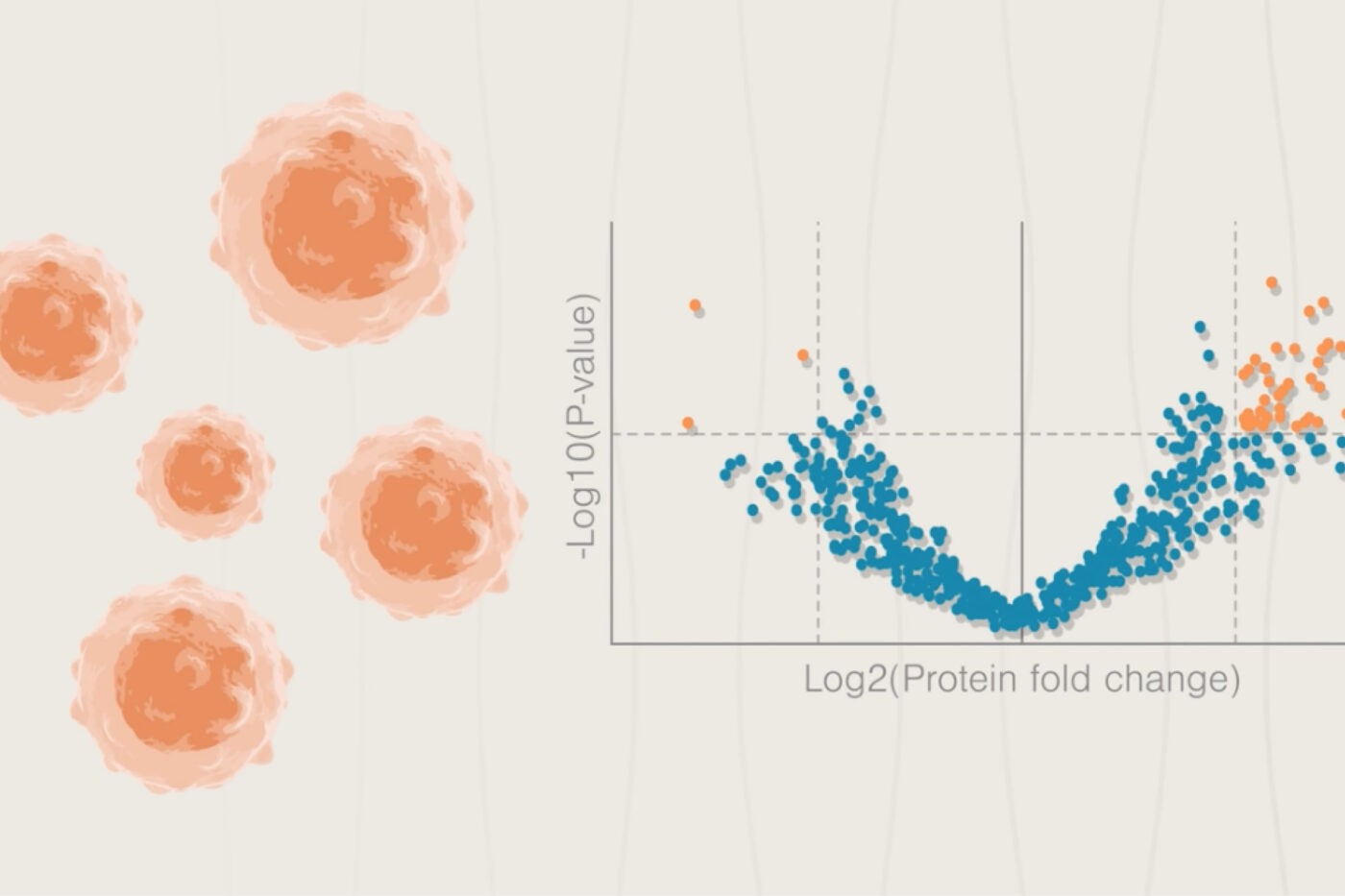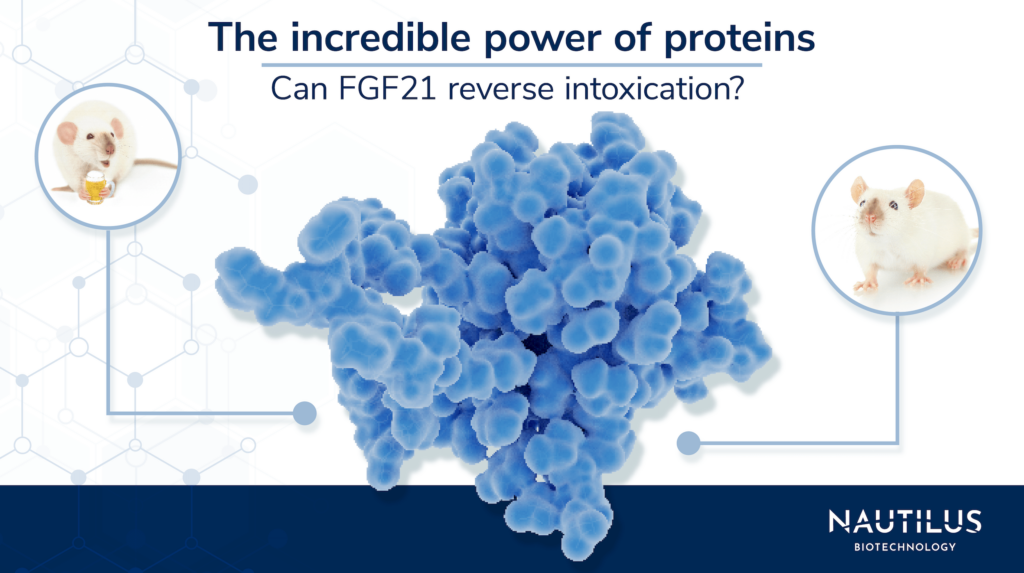
The incredible power of proteins: How the FGF21 protein helps mice sober up

Nathaniel Scharping
April 4, 2023
In our “Incredible power of proteins” series, we highlight recent protein and proteomics research findings showing the incredible ways proteins, and the entire proteome, drive biological processes and alter cellular systems to achieve their effects. In this post, we cover new research into a protein called fibroblast growth factor 21 (FGF21) showing how it can counteract some of the symptoms of inebriation in mice. That’s potentially good news for revelers who overindulge, but deeper knowledge of FGF21 and its place within the proteome are likely needed to build on this finding.
For more from this series, check out our post on the Klotho protein’s ability to enhance cognition in aged monkeys and our post on some of the most important proteins in the human body.

In a study published in Cell Metabolism, researchers found that giving mice extra FGF21, helped them recover more quickly after a simulated night of drinking. FGF21 is naturally found in both mice and humans and is made in the liver in response to various kinds of stress including starvation, protein deficiency, and alcohol. One study published in Molecular Metabolism in 2018 showed FGF21 levels in humans tripled after moderate drinking. Previous studies in mice found that FGF21 suppressed their desire to drink alcohol, promoted drinking water, and protected against alcohol-induced liver injury. If these functions are conserved in humans, FGF21 might be able to help us deal with the lingering effects of alcohol as well.
Of course FGF21, is just one of the tens of thousands of proteins in the human body, many of which have roles we still don’t fully understand. Applying this current research to humans requires going deeper into the proteome, or the collection of all the proteins in a cell, organism, or sample. That’s where new proteomics tools that truly capture an entire proteome come in.
With next-generation proteomics technologies capable of assessing the diversity of the proteome in any sample, we’ll be able to see what proteins are present, how they interact with other proteins, and how their abundances change over time. That kind of information isn’t typically available to scientists right now, but it soon could be.
The FGF21 protein and alcohol
In the latest study, the researchers looked to see what happened both when they gave alcohol to mice engineered to lack the FGF21 protein, and when they gave regular mice supplements of the protein after drinking.
They found that, after being given a dose of ethanol, the mice that couldn’t make FGF21 took longer to recover their balance and ability to land upright than control mice that did have the protein. Giving mice extra FGF21 had the opposite effect: These mice recovered more quickly from the effects of the ethanol.
The takeaway, say the researchers, is that the FGF21 protein has an “anti-intoxicant” effect on mice, wiping away some of the ill effects of the alcohol. They think it’s likely because FGF21 directly activates neurons in the brain that regulate arousal and alertness, helping them recover from intoxication more quickly.
Given its ability to counteract some of the effects of alcohol, FGF21 could be one candidate to help treat alcohol poisoning in the future, the authors suggest. Before we get to that point, though, we’ll need to better understand exactly what FGF21 does in the body, and how it interacts with the liver and brain. That’s where proteomics can come in.
Using proteomics to understand FGF21
Using proteomics, researchers can look to see where a protein is present, in what quantities, and how these change over time. This kind of proteomic analysis is key to discovering exactly what a protein’s function is, and how it responds to and affects other components of the body.
For example, it’s still unclear how FGF21 crosses the blood-brain barrier in mice to reach neurons. Using proteomics, as well as other multiomics techniques, we could watch to see exactly what’s happening at this critical step. Similarly, watching how levels of FGF21 change before, during, and after alcohol consumption could provide even more detail about how it works, and what its role is. Investigating the proteome might also reveal other proteins that are produced by the body in response to alcohol. This could show us how to prevent some of the downsides of alcohol consumption like liver damage, and potentially even hangovers.
Proteomics is well-positioned to reveal these kinds of insights because it can provide a broad look at all the proteins inside a sample at any given time, as well as zoom in to specific proteins and protein interactions. With proteomic analysis, we could watch how the body responds to alcohol in real time. This level of resolution is important for breaking down complex biological events like inebriation into their component parts, which is necessary to fully understand them.
The promise of proteomics extends far beyond alcohol consumption, of course. The same deeper insights into biological processes that could save humanity from the aftereffects of alcohol can also be put to use in expanding the reach of precision medicine treatments that are tailored to individual patients, or finding new biomarkers for cancers that make drug testing more efficient.
As the field expands, enabled by powerful new tools like the Nautilus Proteome Analysis Platform capable of interrogating the entire proteome of a sample, we’re sure to learn astonishing new things about the proteins that underpin so much of biology. An anti-intoxicant could be one of the least important things we discover.
MORE ARTICLES
